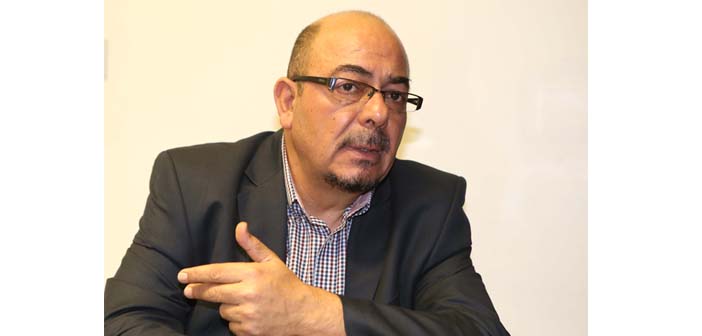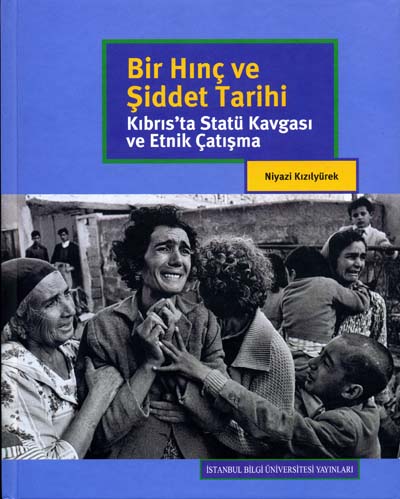‘Kıbrıs’ın acı deneyiminden Kürt sorununda ders alınmalı’


Çalışmanızda ilk kez yayımlanan belgeler ışığında, Ankara hükümetiyle, Özel Harp Dairesi ve Rauf Denktaş’ın şahsında temsil edilen Kıbrıs’taki güç odağı arasındaki çelişkilerle ortaya çıkan tabloyu, Türkiye’de sık gündeme gelen ‘derin devlet’ olgusunun Kıbrıs’taki yansıması olarak değerlendirmek mümkün mü?
‘Derin Devlet’ olgusunun Kıbrıs’la doğrudan bağlantısı olduğu sır değil. Örneğin Mehmet Ağar’ın bir açıklamasında derin devletin en çok “Kıbrıs ve Hatay’da mesai yaptığını” söylediğini hatırlıyorum. Gerçekten de Türkiye’de henüz Özel Harp Dairesi veya Kontrgerilla pek konuşulmazken, derin devlet Kıbrıs’ta işbaşı yapmıştı. Türk Mukavemet Teşkilatı TMT 1958 yılında silahlanıp eyleme geçmişti. Örneğin, 1958 yılının Mayıs ayında solcu Kıbrıslı Türkler hedef seçilmişti. 7 Haziran 1958 tarihinde ise tıpkı Türkiye’de 6/7 Eylül 1955 pogromuna yol açan türden bir provokasyon düzenlendi. Türk Haberler Bürosu’na TMT tarafından atılan bir bomba sonucunda Kıbrıslı Rumlara karşı saldırıya geçildi ve iki toplum arasında etnik çatışmalar büyüdü. Kitabımda, bombayı TMT’nin koyduğunu ve Rauf Denktaş’ın bunda çok önemli bir rol oynadığını bütün kanıtlarıyla gözler önüne seriyorum. Kıbrıs Cumhuriyeti kurulduktan sonra da siyasal cinayetler son bulmadı. 1962 yılında iki toplumun barış içinde yaşamasını savunan gazetecilerden Ayhan Hikmet ile Muzaffer Gürkan 1962 yılında katledildiler. Benzer biçimde sendikacı ve komünist partisi AKEL’in üyesi olan Kıbrıslı Türklerden Derviş Ali Kavazoğlu 1965 yılında öldürüldü.
Bir noktanın daha altını çizmekte yarar var: Özel Harp Dairesi ve ona bağlı olan TMT her zaman Türkiye hükümetleri ile uyumlu çalışmadıkları gibi, zaman zaman çatışan ve zıt yönlerde hareket ediyorlardı. Örneğin Türk Hükümeti 1960-1963 arasında Kıbrıs Cumhuriyeti’nin yaşayıp kökleşmesini savunuyordu ve adaya gönderdiği büyükelçi Emin Dırvana’ya bu yönde direktif vermişti. Oysa Özel Harp Dairesi, TMT ve Rauf Denktaş tam aksi yönde siyaset yapıyor, adanın bölünmesi için uğraşıyorlardı. Bu yüzden büyükelçi Emin Dırvana ile Rauf Denktaş arasında tam bir “savaş” yaşanıyordu.

“Kıbrıs’ta statü kavgası başka araçlarla devam ediyor” diyorsunuz. Bu başka araçlar nelerdir? ‘Statü kavgası’nın nihai çözümü nedir?
Burada sözünü ettiğim şey, artık veya şimdilik Kıbrıs’ta silahların patlamamasına rağmen statü kavgasının henüz bitmediği ve diplomatik yollardan devam ettiğidir. Tarafların uluslararası kamuoyu nezdinde yaptığı hamleler, Türk tarafının zaman zaman güç kullanma veya ilhak tehditleri, Kıbrıs Rum tarafının Avrupa mahkemelerine başvuruları ve nihayetinde Kıbrıs Sorununun çözümüne yönelik müzakereleri ‘başka araçlar’ kategorisinde görebiliriz.
Nihai çözüm denince aklımıza iki tarafın da hemfikir olup benimseyeceği çözüm gelmelidir. Günümüzün koşullarında bu, Kıbrıs’ta iki bölgeli, iki toplumlu, siyasi eşitlik temelinde kurulacak bir federal devlet olarak anlaşılmaktadır.
Kıbrıs’ta halen sürdürülen barış görüşmelerinden neler bekliyorsunuz? Öngörüleriniz nelerdir?
İçinden geçtiğimiz müzakere sürecini bugüne kadar yapılan görüşmelerle karşılaştırırsak, tarafların en ileri gittiği, pek çok konuda anlaştığı müzakere süreci olarak tanımlayabiliriz. Fakat şu da bir gerçektir ki, toprak, güvenlik/garantiler gibi konularda hâlâ derin görüş ayrılıkları vardır. Çözümün ‘Land for Peace’ (Barış İçin Toprak) formülü ile mümkün olabileceğini, yani, Türk tarafının 1974’te ele geçirilen toprakların bir miktarını Rum tarafına vermesi, bunun karşılığında da Kıbrıslı Türklerin Kıbrıslı Rumlarla siyasi eşitlik temelinde egemenliği ve iktidarı paylaşması formülüne dayandığını herkes biliyor. Gelinen aşamada Rum tarafı Kıbrıslı Türklerin siyasi eşitliğini kabul etmiştir ve toprak konusunda tatmin edilmeyi beklemektedir. Bunun mümkün olup olmayacağını çok yakında göreceğiz, çünkü taraflar Kasım ayında toprak konusunu görüşmek için yurt dışına gidecekler.
Kıbrıs tarihindeki ‘amaç uyuşmazlığı’ ve ‘statü kaygısı’ olarak tanımladığınız etnik topluluklar arasındaki gerilimi, Osmanlı coğrafyasının diğer bölgelerinde yaşanan gerilimlerin bir benzeri olarak değerlendirmek mümkün mü?
Kıbrıs’taki etnik çatışmayı istisnai bir durum olarak göremeyiz. Dünyadaki diğer örneklerden çok yararlandığım gibi adadaki tecrübe de diğer örnekleri daha iyi anlamamıza katkı sunuyor. Osmanlı’nın doğu vilayetlerindeki çatışmayı, Balkanlar ve Kafkasya’daki kavgaları incelersek statü kavgasının önemli bir etken olduğunu görürüz. Ancak bugüne gelirsek ‘amaç uyuşmazlığı’ ve özellikle de ‘statü kavgası’ üzerinden düşünmenin Türkiye’de ve Ortadoğu’da Kürt sorununun geldiği aşamayı anlamakta yeni bir pencere açabileceğine inanıyorum. Türkiye kamuoyunda Kürt sorunu etrafındaki tartışmalar yakın zamana kadar büyük ölçüde meselenin kültürel, ekonomik boyutlarına odaklandı ve konunun statü ve duygulanımsal boyutları genelde göz ardı edildi. Özellikle Kürt hareketi çevresinin son on beş yıllık seyrini takip ederseniz statü talebinin en temel vurgu olarak öne çıktığını görürsünüz. Kıbrıs’ın acı deneyiminden ders alınmalı diye düşünüyorum. Türkiye’de Kürtler bugün adem-i merkeziyet, yerelden yönetim ve anayasal statü tanımı isteklerinde bulunuyor. Bu taleplerin şiddet yoluyla bastırılmasının üreteceği hınç hem Türkiye’yi ve hem de daha geniş bir bölgeyi içinden çıkılması çok zor, kanlı bir geleceğe teslim edebilir.
"Hınç kavramı Ermeni Soykırımı’nı daha iyi anlamamıza yardımcı olur"
Kıbrıs’taki ‘amaç uyuşmazlığı’ ve ‘statü kaygısı’ 1915 Ermeni Soykırımı’nı açıklamakta da kullanabileceğimiz kavramlar mıdır?
Sanırım, bence kitabımda Ermeni Soykırımı için de dikkate alınması gereken kavramsal önermeler vardır. Örneğin şiddetin toplumları yeniden şekillendirdiği gibi ve elbette ısrarla altını çizdiğim hınç (ressentiment) kavramı... Hıncın, İttihad ve Terakki liderlerinin ve Müslüman nüfusun Osmanlı Ermenilerine yönelttikleri agresyonu ve ‘aşırı’ şiddeti daha iyi anlamamıza yardımcı olacağını düşünüyorum. Ayrıca Ermenilerin ortadan kaldırılmasının, Ermeni siyasal öznelerinin statü talebinde bulunma ihtimalini de yok etmek anlamına geldiğini de not etmek gerek. Ancak tabii ki bu analojilerin hepsini bağlamların, tarihsel süreçlerin, güç ilişki ve dengelerinin farklılığını da göz önüne alarak yapmak gerek.
Kitaptan: Kıbrıs’ta son durum
İki etnik grup ilk defa 2000’li yılların başında kalıcı bir çözüme yaklaştı. 2004 yılında Rauf Denktaş’ın bütün itirazlarına rağmen, BM Genel Sekreteri Kofi Annan’ın adını taşıyan kapsamlı çözüm önerisi Kıbrıs Türk toplumu tarafından kabul edildi. O tarihlerde Avrupa Birliği üyesi olan Kıbrıslı Rumlar ise büyük beklentiler içine girerek, Annan Planı’nı reddettiler. 2004 tarihinden sonra taraflar arasında imzalanan mutabakatların hepsi de (Talat-Papadopulos, Talat Hristofyas, Eroğlu-Anastasiadis, Akıncı-Anastasiadis) aynı temel prensibe dayanıyor: “İki bölgeli, iki toplumlu ve ilgili BM Güvenlik Konseyi kararlarında tanımlandığı şekliyle siyasi eşitliğe dayalı Federasyon’un kurulması. Bu ortaklığın tek uluslararası kimliğe sahip olan bir federal hükümetin yanı sıra eşit statüye sahip bir Kıbrıs Türk Oluşturucu Devleti ile bir Kıbrıs Rum Oluşturucu Devleti olması.” Ayrıca kurulacak federal devletin “tek egemenliği, tek yurttaşlığı ve tek uluslararası kişiliği” olacağı prensip olarak kabul edilmiştir. Günümüzde Kıbrıs müzakereleri bu temelde sürdürülüyor.
Kısacası, Türkiye’nin askeri kuvvet kullanarak yaratmak istediği anayasal düzen, giderek dünya kamuoyu kadar bizzat Kıbrıslı Rumlar tarafında da kabul edildi. Böylece Türkiye’nin Kıbrıs’ta kullandığı şiddet, hukuk yapıcı şiddete dönüştü.


